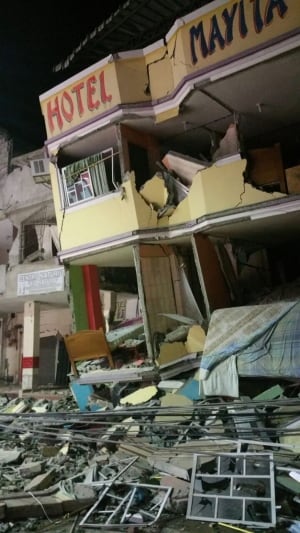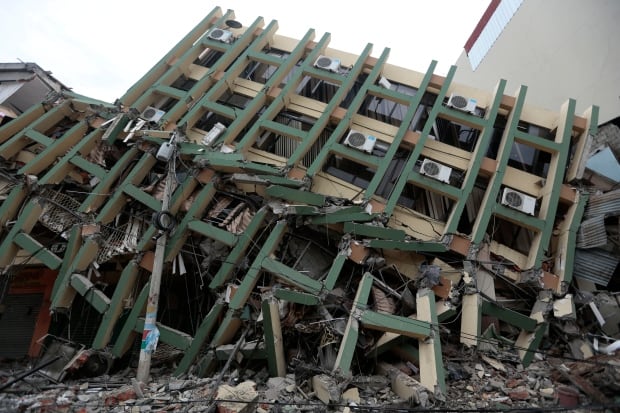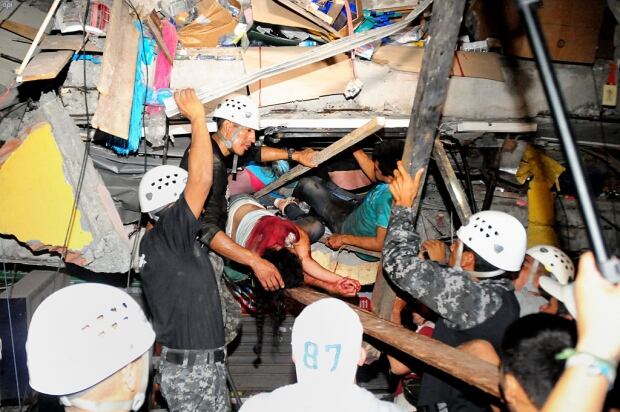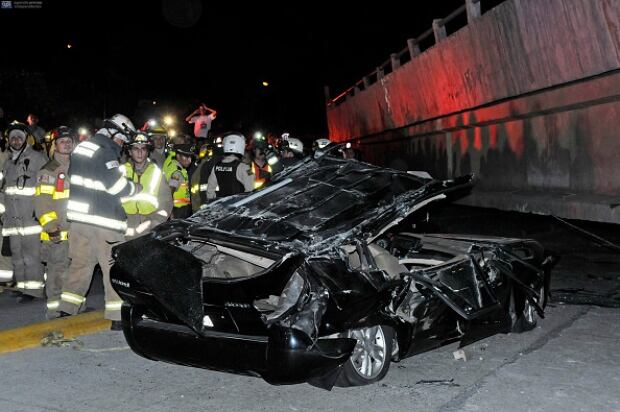Magnitude 7.8 earthquake was country's strongest in decades
The death toll from a magnitude 7.8 earthquake that hit Ecuador's coastal areas has risen to 238.
At least 1,550 people were also injured following the strongest earthquake to hit the country in decades, a sombre Jorge Glas, the country's vice-president, told a news conference, while President Rafael Correa flew back from Rome to deal with the crisis.

A hotel in the town of Manta barely stands after an earthquake hit western Ecuador on Saturday. Panic spread over hundreds of kilometres as the quake collapsed homes and buckled a major overpass.
Two Canadians from Quebec were among those killed in Saturday evening's quake, according to Global Affairs Canada.
"To date, we are working with the families of two Canadian citizens who were tragically killed during this earthquake," spokeswoman Rachna Mishra told CBC News.
"Consular officials in Ottawa are in contact with the family, and have offered their support and consular assistance," she said in an email.
Prime Minister Justin Trudeau and Foreign Affairs Minister Stéphane Dion both offered their condolences Sunday.
The powerful quake flattened buildings and buckled highways along Ecuador's Pacific coast, sending the Andean nation into a state of emergency. The damage stretched for hundreds of kilometres to the capital and other major cities.
The quake was centred on Ecuador's sparsely populated fishing ports and tourist beaches, 170 kilometres northwest of Quito, the capital.
Ecuador's seismological institute has reported more than 135 aftershocks.
Glas said there were fatalities in the cities of Manta, Portoviejo and Guayaquil — all several hundred kilometres from where the quake struck shortly after nightfall.
He said the quake was the strongest to hit Ecuador since 1979 and accessing the disaster zone was difficult due to landslides.

The strongest earthquake to hit Ecuador in decades flattened buildings and buckled highways along its Pacific coast, sending the Andean nation into a state of emergency. (Canadian Press )
"The entire public force is in a state of maximum alert to protect the lives of citizens," Glas said in a televised address.
"We're trying to do the most we can, but there's almost nothing we can do," said Gabriel Alcivar, mayor of Pedernales, a town of 40,000 near the quake's epicentre.
'Entire town' collapsed
Alcivar pleaded for authorities to send earth-moving machines and emergency rescue workers as dozens of buildings in the town were flattened, trapping residents among the rubble. He said looting had broken out amid the chaos but authorities were too busy trying to save lives to re-establish order.
"This wasn't just a house that collapsed, it was an entire town," he said.
President Correa signed a decree declaring a national emergency and urged citizens to stay strong while authorities handle the disaster.
"Everything can be rebuilt, but what can't be rebuilt are human lives, and that's the most painful," he said in a telephone call to state TV before departing for Manta.
Ecuador's Risk Management agency said 10,000 armed forces had been deployed to help. In addition, 3,500 national police were sent to hard-hit towns in the provinces of Manabí and Santa Elena; 500 firefighters were heading to Manabi province and the town of Pedernales and five shelters had been set up for those who had to evacuate their homes.
On social media, photos circulated of homes reduced to rubble, a shopping centre's roof torn apart, supermarket shelves shaking violently and a collapsed highway overpass that crushed a car. In Manta, the airport was closed after the control tower collapsed, injuring an air traffic control worker and a security guard.
In the capital Quito, people fled into the streets in fear as the quake shook their buildings. It knocked out electricity in several neighbourhoods and six homes collapsed but after a few hours, power was being restored, Quito's Mayor Mauricio Rodas said.

The earthquake flattened many buildings and homes, including this one in Portoviejo, Ecuador.
"I'm in a state of panic," said Zoila Villena, one of many Quito residents who congregated in the streets. "My building moved a lot and things fell to the floor. Lots of neighbours were screaming and kids crying."
Among those killed was the driver of a car crushed by an overpass that buckled in Guayaquil, the country's most populous city. The city's international airport was also briefly closed. Hydroelectric dams and oil pipelines in the OPEC-member nation were shut down as a precautionary measure but so far hadn't reported any damages.
Towns near the epicentre were evacuated as a precautionary measure in case of hazardous tsunami waves but several hours later authorities said was safe for coastal residents to return to their homes.

Rescue workers pull survivors from a collapsed building on Sunday, the morning after a powerful earthquake struck the city of Manta, Ecuador.
Sports events and concerts were cancelled nationwide until further notice.
"It's very important that Ecuadoreans remain calm during this emergency," Glas said from Ecuador's national crisis room.
The USGS originally put the quake at a magnitude of 7.4 then raised it to 7.8. It had a depth of 19 kilometres. At least 36 aftershocks followed, one as strong as 6 on the Richter scale, and authorities urged residents to brace for even stronger ones in the coming hours and days.

The tremor caused this bridge to collapse on top of a car in the southern port city of Guayaquil.
The quake comes on the heels of two deadly earthquakes across the Pacific, in the southernmost of Japan's four main islands. A magnitude 6.5 earthquake struck Thursday near Kumamoto, followed by a magnitude 7.3 earthquake just 28 hours later. The quakes have killed 41 people and injured about 1,500, flattened houses and triggered major landslides.
On Sunday, thousands of rescue workers searched a debris-strewn village in southern Japan for about a half-dozen missing people as U.S. military aircraft rushed to join the relief mission.
Ecuador's earthquake was about six times stronger and released more energy than the one in Japan a day before.

No comments:
Post a Comment